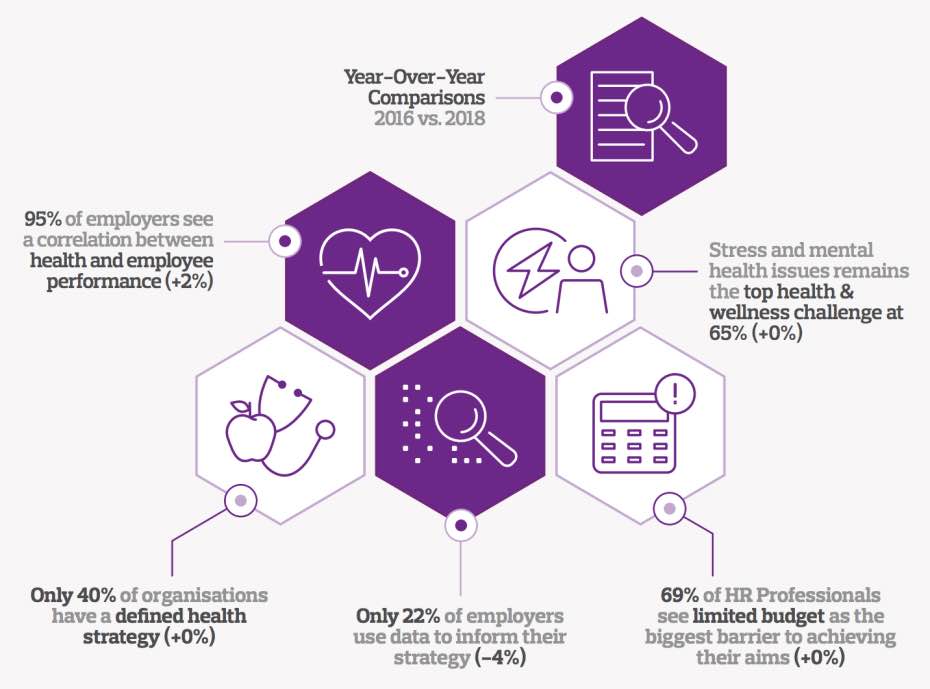The Aon EMEA Health Survey aims to identify the key health issues and trends employers are facing as they develop their people risk strategies.
This year’s survey is bigger than the 2016 edition, now covering 22 countries and again finds some interesting trends, as well as some interesting differences, in the ways employers across the region approach health and wellbeing.
Health and wellbeing is high on the agenda for many employers right now
Health and wellbeing is high on the agenda for many employers right now.
The increased focus on issues such as physical, psychological, social and financial wellbeing is not surprising when many employers are trying to build and develop a health strategy in an increasingly challenging environment.

Una iniciativa de Editorial Mapas Colectivos – #microBooks #lobuenosibreve
Improving engagement
Ongoing economic challenges are a given; other factors include rapidly-evolving healthcare models, including the impact of digital health, which transcend geographical boundaries; the changing needs and requirements of a multigenerational workforce and the desire to improve employee engagement.
This is all in tandem with employers increasingly recognising their role to educate and improve individuals’ often poor lifestyle behaviours
This is all in tandem with employers increasingly recognising their role to educate and improve individuals’ often poor lifestyle behaviours.
Across the EMEA region, attracting and retaining talent is the top HR issue for survey respondents in 2018, and has overtaken increasing productivity and employee performance, which has dropped to the number three issue of concern since the 2016 survey.
Improving engagement and morale is the second highest survey-wide concern.
Employee health and performance
The positive theme running through this survey is that employers overwhelmingly appear to recognise that there is a correlation between employee health and performance (95%) and that they have a role to play in positively influencing good employee health (95%).
There is a correlation between employee health and their performance and that they have a role to play in positively influencing good employee health
Furthermore, it is encouraging that nearly 70% of respondents either have a specific budget in place, or will have within the next two years, to fund health initiatives. However, while it would seem that many employers have positive intentions when it comes to health and wellbeing, there is a concern that some may be guilty of being too tactical and not strategic enoug
As mentioned above, it is really positive that employers overwhelmingly recognise that there is a correlation between employee health and their performance and that they have a role to play in positively influencing good employee health.
 Lifestyle risks, financial, physical and/or emotional wellbeing
Lifestyle risks, financial, physical and/or emotional wellbeing
Furthermore, most employers seem to have a good idea of the types of health and wellbeing issues they need to focus on, for example, lifestyle risks, financial, physical and/or emotional wellbeing.
This tactical approach is evidenced by the fact that only 40% of employers say they have a defined health strategy in place, the same as 2016, and even fewer (36%) have a clear view of the impact (including cost) of the health issues in their organisation.
All too often there appear to be reasons why some employers are not doing more. Having no budget or a limited budget and resources, or not being able to measure the effectiveness of any initiatives are legitimate concerns.
Yet in many cases things do not appear to have moved on since 2016 and employers need to find a way of removing some of these barriers.
Data to support and inform their health and wellbeing strategy
The majority of employers are still not using data to support and inform their health and wellbeing strategy; measure ongoing success and hopefully support the case for future investment.
The majority of employers are still not using data to support and inform their health and wellbeing strategy
The survey results show that some countries are making good progress in this area but overall there is clearly a long way to go. Too many employers are still in the ‘intend to’ camp when it comes to actually using the health data they have at their disposal.
Taking a more data-driven approach to health strategy will pay huge dividends and we would urge all firms to look at this as a matter of urgency. In this report, we guide you through the key findings of the survey on a country-by-country basis.
Taking a fresh look at health is something that would benefit all EMEA employers, no matter their current approach. We hope this survey provides some food for thought.













